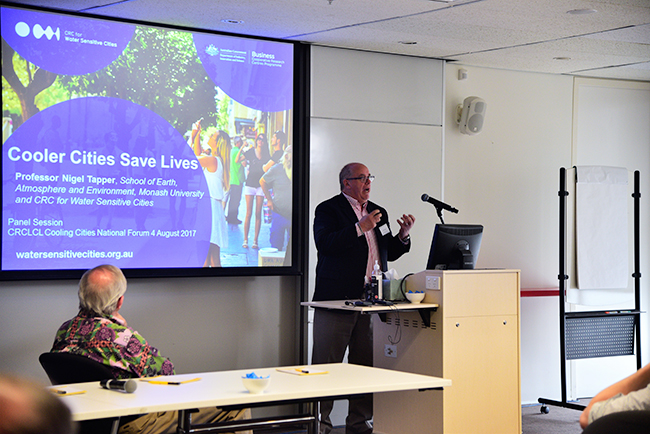Government and industry forum signals national momentum towards cooling Australian cities
Keeping cities cooler is firmly on the national agenda following the first Cooling Cities National Forum, held in Sydney on August 4, 2017.
Hosted by the Cooperative Research Centre for Low Carbon Living (CRCLCL), the forum brought together local, state, and federal government and industry representatives. They were there to discuss evidence-based decision-making for cooling urban microclimates, provide recommendations on mitigation strategies and technologies, and build collaborative efforts across academia, governments, and the built environment industry.
With their hard, impervious surfaces, cities retain the day’s heat to create “islands” that remain hotter than surrounding areas. Elevated heats have profound effects like high energy consumption (which increases carbon emissions) and heatwave-related illness and deaths.
Invited to attend the forum, as presenter and panellist, was Professor Nigel Tapper, Leader of the Cooperative Research Centre for Water Sensitive Cities (CRCWSC) research Program B (Water Sensitive Urbanism), and Researcher on ongoing work on the Economic value of urban heat mitigation (Integrated Research Project 2).
Drawing from extensive research on vegetation and irrigated structures that promote more comfortable, productive cities, and protect vulnerable residents from high temperatures, Prof. Tapper provided an important focus on human health by sharing how “cooler cities save lives”.
“The general forum consensus was that irrigated green infrastructure is top of the list when it comes to cooling Australian cities, and that a combination of approaches is capable of delivering cooling of up to 2°C in our cities under extreme summer heat,” said Prof. Tapper.
The recognition reflects the CRCWSC’s emphasis on water as a powerful means for cooling cities, as well as being fundamental to a broad array of benefits (like flood protection and capturing local water sources, like rain and stormwater) that collectively make cities resilient, sustainable, and liveable.

With CRCLCL work examining important consequences of urban heat for energy consumption and carbon emissions, the CRCWSC applies a complementary lens by providing knowledge and practical tools (such as the Water Sensitive Cities Toolkit) for harnessing the multiple benefits of embedding water in urban landscapes.
The August forum also marked the release of the Guide to Urban Cooling Strategies, which lays out strategies for urban cooling in low carbon and water sensitive cities: urgent priorities in managing the impacts of global climate change.
Capturing work by the CRCLCL, the guide benefits from relevant research at CRCWSC and provides practical guidance for architects, urban designers, planners, local authorities, government agencies, and developers.